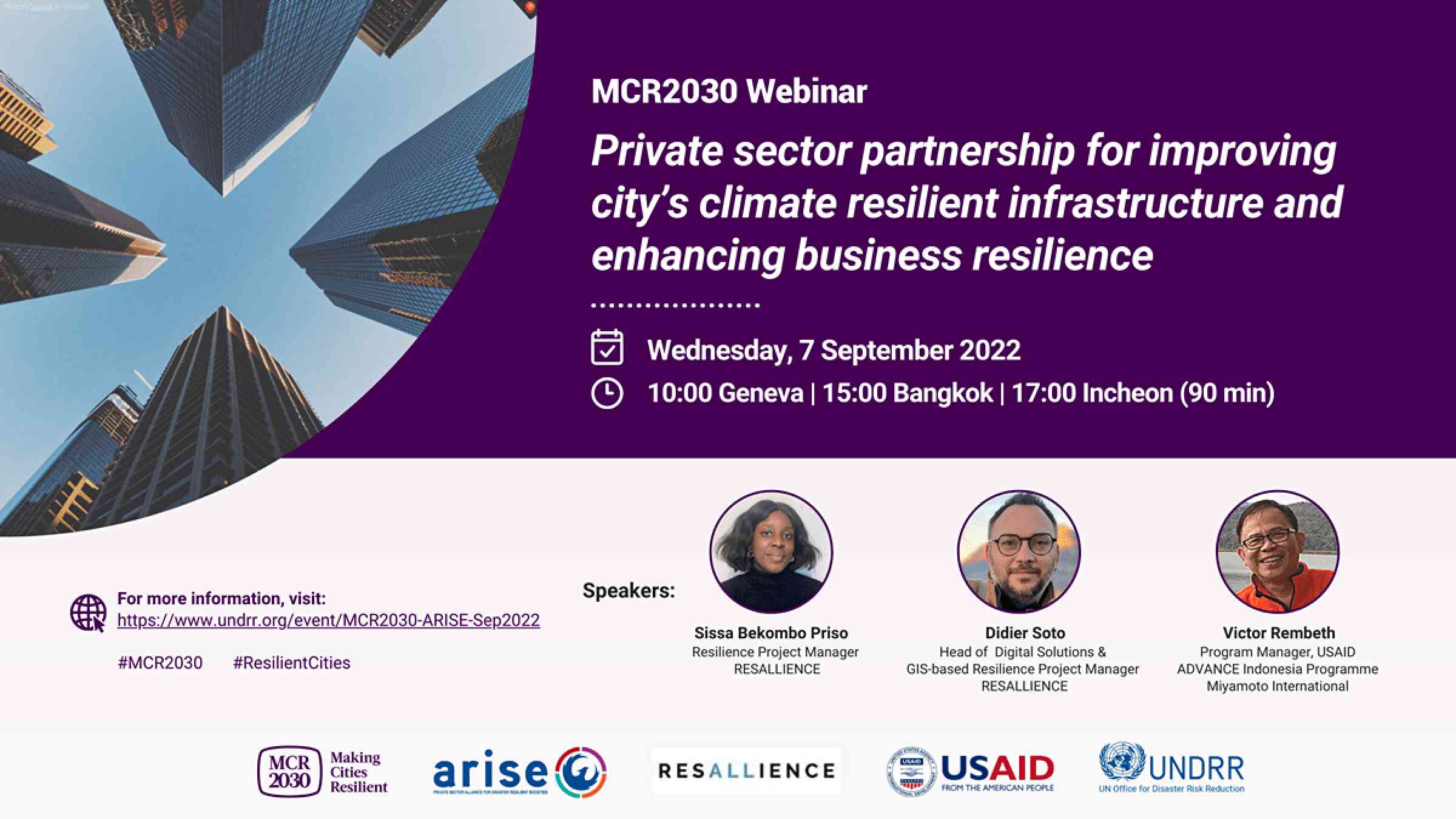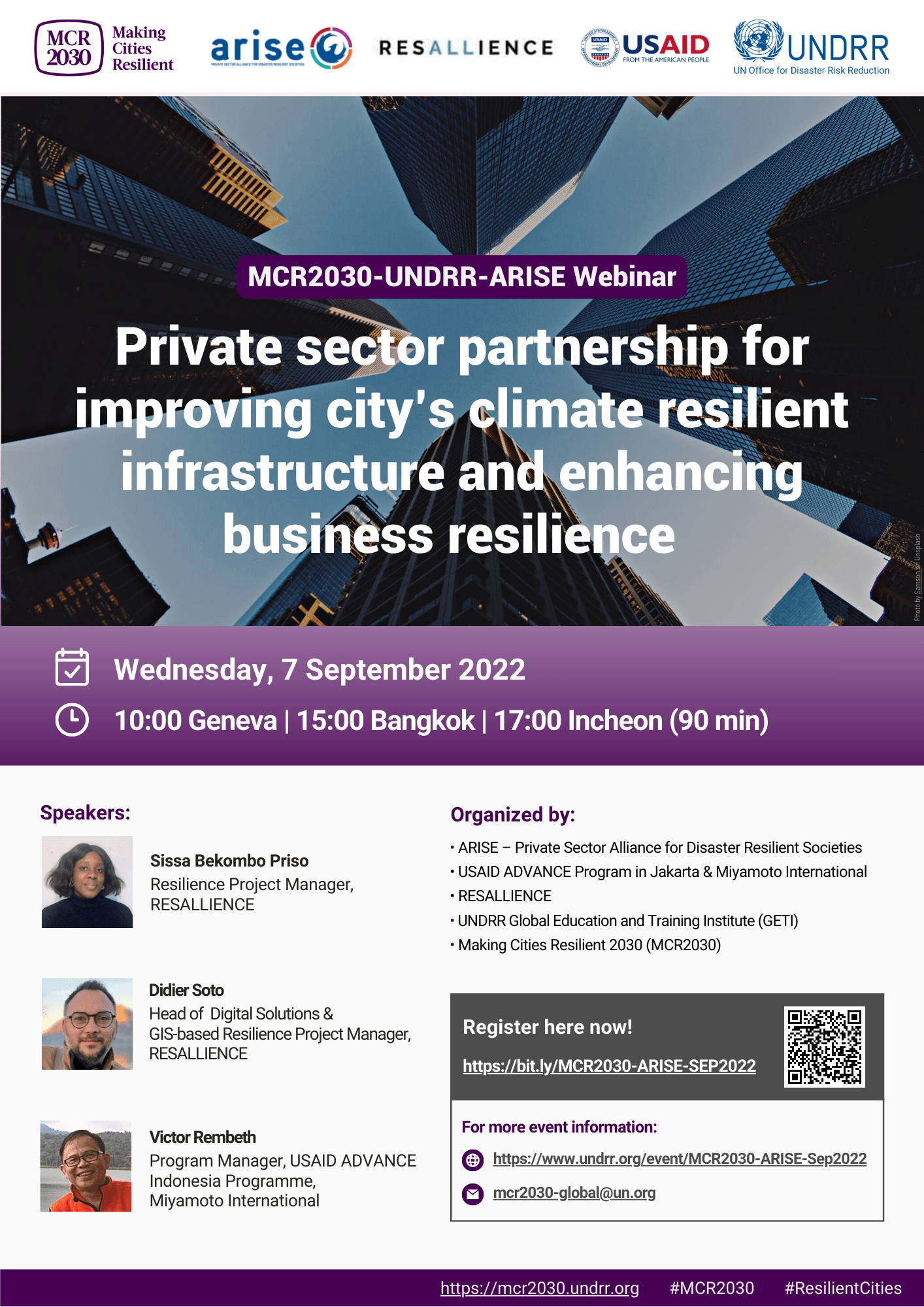[MCR2030-ARISE-UNDRR Webinar] Private sector partnership for improving city’s climate resilient infrastructure and enhancing business resilience

- English
Webinar Recording
Event Description
Sub-national resilience is built by harnessing the strengths and contributions of multiple stakeholders, including private sector entities. As primary innovators and investors, the private sector has a vested interest in making cities work. They may also have the expertise and technical skills local governments require to creating an environment where resilience flourishes. This webinar series is jointly organized by MCR2030 and ARISE - the Private Sector Alliance for Disaster Resilient Societies, aiming to highlight technical expertise and service available by ARISE member companies in supporting cities in building resilience.
Part 1 provides insights to the Resilience Performance Assessment (RPA) tool by RESALLIENCE. RPA is an innovative solution allowing efficiency and balance between climate change mitigation and adaptation about the full infrastructure’s life cycle, buildings, and territories in the face of climate change. It provides a holistic approach combining visualization of both current and future climate change impacts such as hazards and assesses the vulnerability scores of future and existing assets. This decision-making tool also allows the formulation of detailed recommendations and a costs-benefits assessment to estimate the resilience performance of each project or policy aiming at improving resilience of cities/territories. RPA helps cities to gain a comprehensive understanding about current and future climate related risks for cities/territories or asset, costs of action/inaction and improve their decision-making process about future infrastructure investments in the context of changing climate. The presentation will include the introduction to the RPA tool and the demo of its usage. The RPA tool is available for MCR2030 cities on the MCR2030 dashboard at Resilience Performance Assessment (RPA)
Key questions:
- What is RPA, what is does and who is behind it?
- How can RPA help cities to comprehensively analyze and visualize climate risks (current and projected) and the balance between climate change mitigation and adaptation?
- How can RPA help cities to estimate the action/inaction costs and for decision making?
- How RPA can support cities to improve their infrastructure management in the face of climate change?
Part 2 features USAID ADVANCE INDONESIA programme by Miyamoto International. This programme highlights an example of public-private partnership in Jakarta, Indonesia, which helps improve private sector engagement in community disaster risk reduction. The session will provide information on the framework and tools such as the business neighborhood resilience survey tool and map that can support city in stimulating business continuity planning while linking with the community resilience. It will also feature the Business Resilience Assessments which helps small and medium enterprises better understand their structural vulnerability and cost-effective options to enhance resilience.
Key questions:
- How to examine structural and non-structural business resilience measures?
- How can understanding community risk profiles and linkages help enhance business resilience?
- How can hands-on scenario-based action planning help raise business’ awareness of risk?
- How can private sector support cities in strengthening resilience?
Speakers
- Sissa Bekombo Priso, Resilience Project Manager, RESALLIENCE
- Didier Soto, Ph.D., Head of Digital Solutions & GIS-based Resilience Project Manager, RESALLIENCE
- Victor Rembeth, Program Manager for USAID ADVANCE Indonesia Programme
Moderator:
- Sanjaya Bhatia, Head of Office for Northeast Asia and Global Education and Training Institute (GETI), UNDRR
Organizers
- ARISE – Private Sector Alliance for Disaster Resilient Societies
- USAID ADVANCE Program in Jakarta and Miyamoto International
- RESALLIENCE
- UNDRR Global Education and Training Institute (GETI)
- Making Cities Resilient 2030 (MCR2030)
Event Date & Time
- Date: Wednesday, 7 September 2022
- Time: 10:00 Geneva | 15:00 Bangkok | 17:00 Incheon
- Duration: 90 min
- Language: English
About ARISE – Private Sector Alliance for Disaster Resilient Societies
ARISE, the Private Sector Alliance for Disaster Resilient Societies, is a network of private sector entities committed to helping to implement the Sendai Framework, and led by UNDRR. ARISE mobilizes and facilitates the private sector to carry out risk-informed investments and to apply business practices that reduce and prevent the creation of risk, build resilience and enhance recovery from disasters, in line with the Sendai Framework. Organized into national networks, of which there are currently 28 worldwide, ARISE focuses on four priorities: SMEs; integrating DRR into investment decisions; incentivizing DRR within the insurance industry, and resilient infrastructure. For more information: www.ariseglobalnetwork.org
About RESALLIENCE
RESALLIENCE by SIXENSE is a recognized engineering consultancy company, pioneering approaches towards increased resilience of territories to climate change. We bring together a dynamic and visionary team of engineers, geographers, climatologists, data scientists, architects, urban and land use planners whose aim is to increase infrastructure resilience through innovative technical and Nature-based Solutions. Our services: Analyses: vulnerability analyses for territories, territorial diagnosis and methodologies development, disaster and risk assessment, remote sensing and GIS based modelling, predictive monitoring, weather and climate data analysis, TCFD reporting Innovative solutions: technical and functional engineering, Nature-based Solutions, hybrid solutions in the field of infrastructure, land use, transport, mobility, energy, tailor-made digital tools. For more information: https://www.resallience.com/
About Miyamoto International
Miyamoto International (Miyamoto) is a global, multi-hazard engineering and disaster risk management firm that builds resilience to sustain economies, safeguard communities and save lives around the world. Built on decades of engineering expertise in the field, as well as frontline experience responding to more than 100 disasters, Miyamoto’s specialists support how partners address the economic, political, social, sustainability and resiliency challenges in disaster risk reduction and post-disaster recovery and reconstruction.
For more information: https://miyamotointernational.com
About USAID ADVANCE
The role of the private sector is also increasingly visible for the role it plays in disaster response. The Advancing Private Sector Engagement in Disaster Preparedness & Response in Indonesia (USAID ADVANCE Indonesia) Program increases private sector disaster preparedness and involvement in disaster risk management (DRM) for a reduction in lives lost, people injured and social and economic disruption from an earthquake in the city of Jakarta, Indonesia. The USAID ADVANCE Program has used (and continues to use) private sector engagement (PSE) as a strategic approach whereby critical humanitarian assistance aims are advanced by consulting, strategizing, aligning, and jointly implementing programming with and for the local private sector in Indonesia for greater scale, sustainability, localization, and effectiveness of humanitarian outcomes.
About the UNDRR Global Education and Training Institute (UNDRR GETI)
UNDRR GETI was established in 2010 to develop a new cadre of professionals in disaster risk reduction and climate change adaptation to build disaster resilient societies. GETI has a global mandate to provide capacity building support to mainstream disaster risk reduction and climate change adaptation into sustainable development; convene and support inter-city learning to strengthen resilience (Making Cities Resilient); and to provide capacity building and best practice sharing support to national training institutions working on resilience issues. Based in Incheon, the Republic of Korea, UNDRR GETI is also the global secretariat of the Making Cities Resilient 2030 (MCR2030).
For more information: https://www.undrr.org/incheon
About the Making Cities Resilient 2030 (MCR2030)
Making Cities Resilient 2030 (MCR2030) is a unique cross-stakeholder initiative for improving local resilience through advocacy, sharing knowledge and experiences, establishing mutually reinforcing city-to-city learning networks, injecting technical expertise, connecting multiple layers of government and building partnerships.
Through delivering a clear 3-stage roadmap to urban resilience, providing tools, access to knowledge, monitoring and reporting tools. MCR2030 will support cities on their journey to reduce risk and build resilience.
MCR2030 aims to ensure cities become inclusive, safe, resilient and sustainable by 2030, contributing directly to the achievement of Sustainable Development Goal 11 (SDG11) “Make cities and human settlements inclusive, safe, resilient and sustainable”, and other global frameworks including the Sendai Framework for Disaster Risk Reduction, the Paris Agreement and the New Urban Agenda.
For more information: https://mcr2030.undrr.org/
For more information
MCR2030 Global Secretariat at mcr2030-global@un.org


